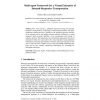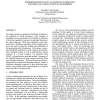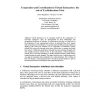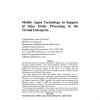133
click to vote
IJNVO
2007
15 years 1 months ago
2007
: A Virtual Enterprise (VE) can be described as an organisational form that emerges when individual entities form a team of partners to achieve a specific goal. The ability to asse...
145
click to vote
AI
2008
Springer
15 years 2 months ago
2008
Springer
Abstract. This work presents a multiagent framework design for DemandResponsive Transportation, considering a virtual enterprise domain. The agent architecture obtained provides a ...
167
click to vote
ISDO
2000
15 years 3 months ago
2000
Cross-organizational workflow management is an essential ingredient for process integration in virtual enterprises. To obtain cross-organizational workflow processes with robust s...
123
click to vote
WSC
2001
15 years 3 months ago
2001
This paper presents an application distributed simulation to the evaluation of virtual enterprises. Each company or candidate can use a simulation of its facilities to determine i...
111
click to vote
IADIS
2004
15 years 3 months ago
2004
The top-down implementation of information and communication technology does not guarantee necessary organizational change in e-learning and virtual enterprises. The delivery of o...
128
click to vote
AIM
2006
15 years 3 months ago
2006
: Virtual Enterprises are an emerging model for the organization of innovative enterprises. They are characterized by brief relationships and geographical dispersion of members. E-...
120
click to vote
PRICAI
2000
Springer
15 years 5 months ago
2000
Springer
Current research identifying architectures for a virtual enterprise has moved from information modelling to role modelling. Thus, a high level of autonomy results from the distribu...
101
click to vote
IFIP
2000
Springer
15 years 5 months ago
2000
Springer
Virtual enterprises have great difficulty in defining and adapting their business processes across the members of the virtual enterprise. We introduce an approach that allows (semi...
131
click to vote
IFIP
1998
Springer
15 years 6 months ago
1998
Springer
The flexible integration of a range of disparate IT applications is a key requirement for today's global enterprises. The virtual enterprise, formed by a collection of collab...
126
click to vote
IFIP
1999
Springer
15 years 6 months ago
1999
Springer
Supply Chain Management (SCM) plans and controls the production over a group of autonomous enterprises. Process-oriented design is used to eliminate inefficiencies of the chain on...






